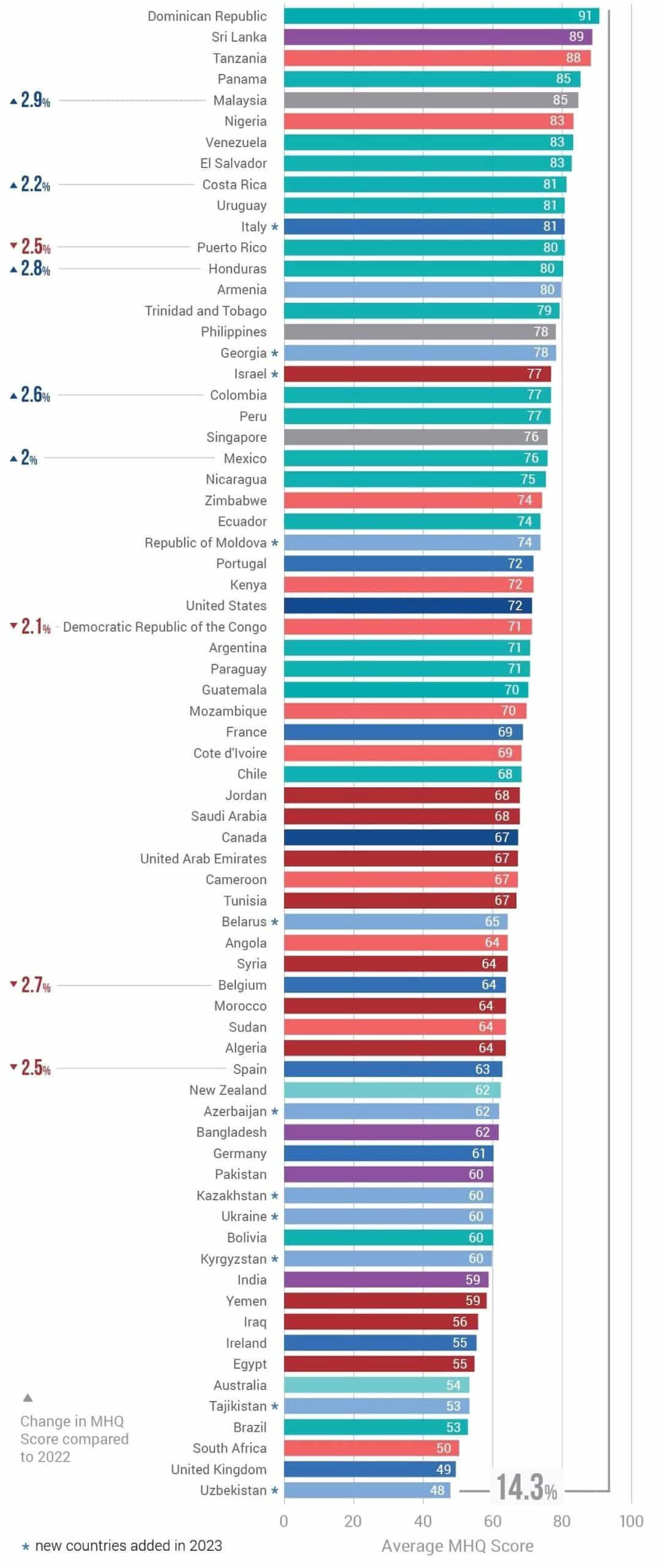Mental wellbeing has become increasingly important for overall health in our rapidly changing world. The UK, despite being a developed nation, faces several challenges in this area.
A recent survey conducted by US-based non-profit organisation Sapien Labs has ranked the UK as the second most mentally distressed country in the world, just behind Uzbekistan. The survey, named ‘Mental State of the Year,’ included around half a million participants from 71 countries.
Similar to previous years, several African and Latin American countries top the country rankings, while wealthier core Anglosphere countries such as the UK and Australia are at the bottom.
The survey analysed the impact of individual mental wellbeing on one’s capabilities. Countries were rated on a scale :
- Less than 0: Distress or Struggle
- 0-50: Enduring Conditions
- 50-100: Management of Circumstances
- 100-200: Success or Thriving

The UK scored 49, placing it in the ‘Enduring Conditions‘ category. This result reveals a high level of psychological distress in the country, indicating a significant struggle for its inhabitants.
To put this in perspective, the global average was 65, significantly higher than the UK’s score. Such a stark contrast demonstrates the urgency of addressing the issue of mental wellbeing in the UK.
In terms of the proportion of respondents reporting distress, the UK was tied with South Africa for the highest proportion, at a worrying 35%. Interestingly, even nations facing grave humanitarian crises, like Yemen, recorded higher wellbeing scores (59).
Factors Behind the UK’s Low Ranking
Several factors appear to have contributed to the UK’s low score. There have been two recessions since the start of the pandemic, exacerbating existing economic and social challenges.
- Economic Recessions: The UK has experienced two economic recessions since the start of the pandemic, resulting in an increase in stress and anxiety.
- Cost of Living Crisis: Higher housing costs and a general increase in the cost of living have led to financial distress.
- Lack of Trust in Leaders: A perceived lack of effective governance has led to dissatisfaction and mental strain.
The data indicates additional factors, such as the age at which a young person receives their first smartphone and the high usage of smartphones, especially among young people. Using data from a sample of 27,969 respondents, it was found that for today’s 18-24 year olds, the first generation to be born into a world of smartphones and social media, the younger they were when they got their first smartphone, the worse their mental health outcomes were in adulthood.
Furthermore, consuming a high intake of ultra-processed foods and having fewer social connections can all have a negative impact on mental wellbeing. The study, based on a sample of 292,786 respondents, showed that more frequent consumption of ultra-processed foods is associated with significantly poorer mental wellbeing at all ages, with a broad impact on symptoms of depression and emotional and cognitive control.
However, it is worth noting that this is a global concern, not just in the UK. The Covid-19 pandemic has caused distress levels to rise worldwide, and unfortunately, there has been little improvement since.










